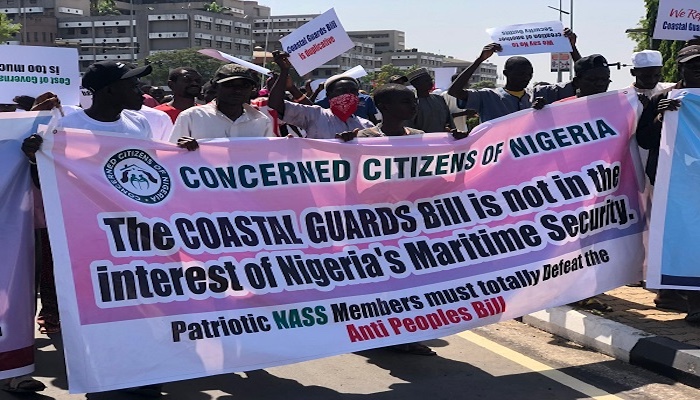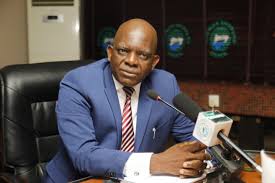
Years after the idea was jettisoned by the Federal Government, it is now certain that the incumbent administration is interested in creating a Nigerian Coast Guard, with responsibilities over the nation’s vast coastal areas.
There is now a bill titled “Nigerian Coast Guard (Establishment) Bill 2024 (SB. 575)” at the National Assembly. It is a private member Bill sponsored by Senator Wasiu Eshilokun (APC- Lagos).
From all indications, the Bill has already created a sharp division between stakeholders in the Nigerian maritime and related industries, as well as the military
From what played out the recent public hearing on the Bill, the Nigerian Navy, some members of the National Assembly, and a coalition of civil society organisations have voiced strong opposition to the bill.
They argued that bill aims to create a military branch under the Ministry of Marine and Blue Economy.
For instance, representative of the Chief of Naval Staff; Rear Admiral Olusegun Ferreira, who is Navy’s Chief of Training and Operations, pointedly argued against the establishment of a Coast Guard with overlapping military powers.
Ferreira stated that the “United Kingdom does not have a Coast Guard with military powers similar to those being proposed in the Nigerian Coast Guard bill. Instead, the Royal Navy handles military defence and maritime security, while the UK Coast Guard focuses on search and rescue under the Maritime and Coast Guard Agency.”
He added that many nations, including South Africa, avoid establishing separate Coast Guard entities, opting to consolidate resources within their naval forces for greater efficiency.
Following from the public hearing, there have been dissenting opinions between proponents and opponents of the Coast Guard bill.
While some argue that it is a necessary step toward improved maritime governance, others claim it will lead to redundancy, operational conflicts, and a waste of resources.
At the heart of the debate is the bill’s aim to establish a dedicated Coast Guard to handle law enforcement, environmental protection, and search and rescue operations within Nigeria’s maritime environment.
Proponents see it as a solution to Nigeria’s pressing maritime challenges, but critics believe existing agencies like the Nigerian Navy and NIMASA already cover these responsibilities.
A closer look at the provisions of the bill reveals that the proposed Nigerian Coast Guard will operate like the Military and in fact, it is being proposes to be an arm of the military, even though it will be domiciled in the Ministry of Marine and Blue Economy.
We are curios that a bill that seeks to create another military arm as a Coast Guard emanated from a member of the National Assembly, and not even as an Executive Bill from the President.
Even though coated mischievously, the Coast Guard that Senator Eshilokun and Minister Oyetola seek to create is akin to cloning the Nigerian Navy.
In an attempt to hoodwink members of the National Assembly and the larger stakeholders, it’s promoters argue that, while the Nigerian Navy is a military organ, the Coast Guard is proposed to be a civil law enforcement agency to implement maritime regulations and protect natural resources and inland waters.
Truth be told, there is nothing that the Coast Guard (as we are being made to understand) will do, that agencies such as: Navy, National Inland Waterways Authority, Nigerian Maritime Administration and Safety Agency (NIMASA) and to large extent the Marine Police division of the Nigerian Police are not doing currently. Even if they are not perfect about it, it still does not justify the creation of another quasi-military agency. Specifically, NIWA has the sole responsibility of enforcing laws and regulations in Nigeria’s brown waters.
It is laughable that the Coast Guard being proposed will be responsible for the training of seafarers, a responsibility already bestowed on NIMASA, courtesy of the Merchant Shipping Act and the NIMASA Act.
Perhaps, more important is the fact the controversial Bill will scatter all already established and functioning maritime security and safety apparatuses. This is apart from the huge financial outlay that would be involved.
We are in agreement with the position of the Chairman, Senate Committee on Interior, Senator Adams Oshiomhole, who pointed out Nigeria’s financial limitations to accommodate such a duplication.
“We are living on borrowed funds. It is improper to take loans to establish a new agency,” he had cautioned his colleagues who were pushing for the Bill. This is even as he questioned the rationale behind placing a military service agency under the Ministry of Marine and Blue Economy, rather than the Ministry of Defence.
In like manner, we agree with the position of Philip Agbese of the House of Representatives. He cautioned that creating a Coast Guard would not resolve the challenges facing Nigeria’s waterways. Rather, the new agency will only become another avenue for wasteful spending, especially in the face of the huge financial strain that Nigeria faces at the moment.
We recall that one of the reasons for expending so much money on the on Deep blue assets of NIMASA is to provide maritime security and safety on all parts of the nation’s maritime environment. If the critical assets acquired for the Navy under its Falcon Eye maritime security assets are combined with those of NIMASA, the nation would have no need for the Coast Guard. The two agencies currently have Memorandum of Understanding.
We are also curious that a minister of Marine and Blue Economy, who no too long ago vehemently opposed a similar Marine Corps Bill, will now be pushing desperately for a Coast Guard.
Perhaps, the greatest challenge in the Nigerian Coast Guard is the danger of inter-agency rivalry. The fact that it proposes to draw its personnel from all arms of security agencies is a recipe for national security threat and inter-agency rivalry.
An additional agency will increase dysfunction in the security architecture of the country. A careful perusal of the Nigerian Navy Establishment Act and the provisions of the new Bill reveals that the navy is already empowered to do all that the Coast Guard proposes to do.
It is our candid submission that the Nigerian Coast Guard, rather than effectively contribute to solving the problem of maritime insecurity, it will compound existing challenges being experienced in the administration of Nigeria’s maritime environment by existing agencies.
Sadly, the Nigerian Coast Guard will complicate coordination, heighten unhealthy competition and undermine cohesion, leading to anarchy among existing authorized agencies if the government.















